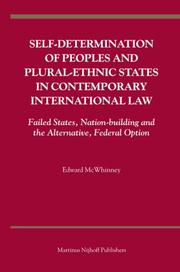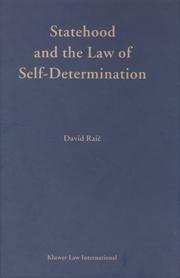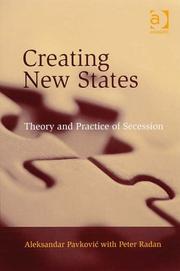| Listing 1 - 10 of 157 | << page >> |
Sort by
|
Book
ISBN: 3838272188 9783838272184 3838212185 Year: 2019 Publisher: Stuttgart : Ibidem-Verlag,
Abstract | Keywords | Export | Availability | Bookmark
 Loading...
Loading...Choose an application
- Reference Manager
- EndNote
- RefWorks (Direct export to RefWorks)
Nationalism. --- Nationalism --- Nationalities, Principle of.
Book
ISBN: 1316484653 1316485080 131648551X 1316485943 1316487660 1316340635 1107119138 1107545153 9781107119130 1316482073 9781316487662 9781316485941 Year: 2016 Publisher: Cambridge : Cambridge University Press,
Abstract | Keywords | Export | Availability | Bookmark
 Loading...
Loading...Choose an application
- Reference Manager
- EndNote
- RefWorks (Direct export to RefWorks)
When can a group legitimately form its own state? Under international law, some groups can but others cannot. But the standard is unclear, and traditional legal analysis has failed to elucidate it. In The Theory of Self-Determination, leading scholars chart new territory in our theoretical conception of self-determination. Drawing from diverse scholarship in international law, philosophy, and political science, they attempt to move beyond the prevailing nationalist conceptions of group definition. At issue are such universal questions as, when does a group qualify as a 'people'? Does history matter? Or is it a question of ethnic status? Are these matters properly solved by popular vote? Anchored in modern analytical political philosophy but with implications for a wide range of scholarship, this volume will prove essential for scholars and practitioners of international law, global justice, and international relations.
Self-determination, National. --- National self-determination --- Nationalism --- Nation-state --- Nationalities, Principle of --- Sovereignty --- Self-determination, National

ISBN: 1281921831 9786611921835 904742347X 9789047423478 9004158359 9789004158351 9789004158351 Year: 2007 Publisher: Leiden ; Boston : Martinus Nijhoff Publishers,
Abstract | Keywords | Export | Availability | Bookmark
 Loading...
Loading...Choose an application
- Reference Manager
- EndNote
- RefWorks (Direct export to RefWorks)
In analysing the contemporary International Law principles as to Self-determination of Peoples, Dr. Edward McWhinney gives a special attention to the crisis today of multinational states put together, usually hurriedly and without proper regard for foreseeable later problems in establishing a plural-constitutional order system, by the military victors in World War I in the imposed Peace treaties of 1919. The key to successful exercise of a claimed right to self-determination is Recognition by other, existing states in the World Community and today also admission to the United Nations. In examining the classical rules on Recognition of States and the recent developed practice as to U.N. Membership, the author signals the continuing antinomy of Law and Power and how high political concerns for their own conceived national interests influence or control decisions on application of the legal ground rules in concrete cases by heads of government and their foreign ministries. The author notes at the same time the attempt to consolidate and codify existing rules on a political 'regional' basis, most evident perhaps with the European Union today. In addressing the claimed new legal category of 'failed state' with the concomitant asserted legal right of other states to intervene, if necessary unilaterally or outside the United Nations, to impose their own 'corrective' measures, he suggests that the postulated 'failure' in such cases may frequently stem less from problems inherent in the state concerned than from past hegemonial actions by outside states in pursuit of their own geopolitical interests in the region. A special concluding chapter draws on the empirical record of the historical, often trial-and-error experience of the Succession states to the Versailles treaties settlements and to the assorted acts of Decolonisation of the former European Imperial, Colonial powers.
Self-determination, National. --- State succession. --- Nationalities, Principle of. --- Ethnic relations --- Federal government. --- Political aspects. --- United Nations.
Book
ISBN: 0813051983 0813052742 9780813052748 9780813051987 081306337X 9780813063379 9780813062266 Year: 2017 Publisher: Gainesville, Florida : University Press of Florida,
Abstract | Keywords | Export | Availability | Bookmark
 Loading...
Loading...Choose an application
- Reference Manager
- EndNote
- RefWorks (Direct export to RefWorks)
"Contributors illuminate the role of external actors in Haitian sovereign affairs over the course of the last decade, concurrently discussing how Haitians reinforce their self-determination on economic, political, and cultural levels"--Provided by publisher.
Self-determination, National --- National self-determination --- Nationalism --- Nation-state --- Nationalities, Principle of --- Sovereignty --- Haiti --- Politics and government --- History.
Book
ISBN: 9789633867716 9633867711 9633867703 Year: 2024 Publisher: Budapest : Central European University Press,
Abstract | Keywords | Export | Availability | Bookmark
 Loading...
Loading...Choose an application
- Reference Manager
- EndNote
- RefWorks (Direct export to RefWorks)
Following the imposition of Habsburg rule on Ottoman Bosnia in 1878, a new garrison was constructed in the old citadel of Trebinje. By using a micro-historical approach, this innovative book tells the story of the garrison in times of peace and war, describing the way in which the Austro-Hungarian administration rapidly transformed Trebinje into a tree-lined city dominated by the army. Yet, the Habsburg "civilizing mission," marked by the building of hospitals, schools, roads, and railways was accompanied by ruthless violence against those who resisted the new foreign occupiers, especially after 1914. The tragic violence is described in the book alongside accounts of daily life. By personalizing historical events, the narrative reveals the perspective of people who found themselves in Trebinje and its garrison complex: the ordinary soldier, the condemned “insurgent,” the career officer, the cook, the shepherdess, the hotelier, or the journalist—all willing or unwilling participants in an extra-European style colonial project in the heart of Europe.
HISTORY / Europe / Austria & Hungary. --- Balkan Borders. --- Conscription. --- Diaries. --- First World War. --- Hercegovina. --- Insurgents and Counterinsurgency. --- Memoirs. --- Military Occupation. --- Nationalities.
Book
ISBN: 9789004232945 900423294X 1306405211 9004232966 9789004232969 9789004232976 9004232974 Year: 2014 Publisher: Leiden, Netherlands : Brill Nijhoff,
Abstract | Keywords | Export | Availability | Bookmark
 Loading...
Loading...Choose an application
- Reference Manager
- EndNote
- RefWorks (Direct export to RefWorks)
Peoples and International Law is a detailed survey of the law of self-determination with a focus on the concept of nations and peoples. It engages with different aspects of this law with particular emphasis on the drafting and implementation of international instruments. The second edition includes new coverage of the Declaration on the Rights of Indigenous Peoples and the African and Arab charters. It considers recent practice by the Human Rights Committee, Committee on Economic, Social and Cultural Rights and African Commission on Human and Peoples' Rights dealing with the emerging political
International law --- Nationalism --- Nationalities, Principle of --- Self-determination, National --- National self-determination --- Nation-state --- Sovereignty --- Nationality, Principle of --- Principle of nationalities --- Minorities --- Consciousness, National --- Identity, National --- National consciousness --- National identity --- International relations --- Patriotism --- Political science --- Autonomy and independence movements --- Internationalism --- Political messianism --- Law of nations --- Nations, Law of --- Public international law --- Law --- International law. --- Self-determination, National. --- Nationalism. --- Nationalities, Principle of.
Book
ISBN: 9780773547407 9780773547391 9780773599383 9780773599390 077359938X 0773599398 0773547401 0773547398 Year: 2016 Publisher: Montreal, [Quebec] : McGill-Queen's University Press,
Abstract | Keywords | Export | Availability | Bookmark
 Loading...
Loading...Choose an application
- Reference Manager
- EndNote
- RefWorks (Direct export to RefWorks)
How the parliaments of minority national communities and central parliaments express identities and treat self-determination claims.
National movements --- 214 Parlement --- Legislative bodies. --- Nationalities, Principle of. --- Self-determination, National. --- Legislative power. --- Autonomy. --- Ethnicity --- Parlements. --- Nationalisme. --- États multinationaux. --- Fédéralisme. --- Autonomie. --- Minorités --- Power, Legislative --- Constitutional law --- Implied powers (Constitutional law) --- Judicial review --- Separation of powers --- National self-determination --- Nationalism --- Nation-state --- Nationalities, Principle of --- Sovereignty --- Nationality, Principle of --- Principle of nationalities --- Minorities --- Self-determination, National --- Bicameralism --- Legislatures --- Parliaments --- Unicameral legislatures --- Estates (Social orders) --- Representative government and representation --- Independence --- Self-government --- International law --- Political science --- Political aspects. --- Aspect politique.

ISBN: 904111890X 9786610468164 1417551453 1280468165 904740338X 9781417551453 9789047403388 9789041118905 Year: 2002 Volume: 43 Publisher: The Hague ; New York : Kluwer Law International,
Abstract | Keywords | Export | Availability | Bookmark
 Loading...
Loading...Choose an application
- Reference Manager
- EndNote
- RefWorks (Direct export to RefWorks)
This text examines the modern law of statehood, and in particular the role of the law of self-determination in the process of the formation of States in international law. The study shows that the law of statehood has changed considerably since the establishment of the United Nations.
National state --- Self-determination, National --- National self-determination --- Nationalism --- Nation-state --- Nationalities, Principle of --- Sovereignty --- State, The --- National interest --- Juristische Person --- Nation-state. --- Self-determination, National.

ISBN: 9004142045 9786610867479 1429452609 9047406818 1280867477 1433706954 9781429452601 9789004142046 9789047406815 Year: 2005 Publisher: Leiden ; Boston : Martinus Nijhoff Publishers,
Abstract | Keywords | Export | Availability | Bookmark
 Loading...
Loading...Choose an application
- Reference Manager
- EndNote
- RefWorks (Direct export to RefWorks)
The beginning of the 21st century is characterized by global structural changes and worldwide concern for the problems surrounding the relationships between states and minority groups. Autonomy has become a code word for an all-purpose means of inclusion of sub-state groups in the three major functions that make for the essence of international law: the allocation of competence, the furtherance of common interest and the maintenance of international peace. Since to be autonomous is to be a law to oneself, and autonomous agents are self-governing agents, the authors of this present volume try give an answer - each from a particular professional perspective- to one overriding question: what conditions must be met in order to ensure that the autonomous agents govern themselves, and govern effectively. With a scholarly attention to analytical precision, factual accuracy, and scrupulous objectivity the authors of the present volume - coming from such diverse fields as international law, philosophy, ethics, economics, political science, - detail and explore the protean character of autonomy as both a concept (autonomy's subtypes, autonomy vs. other arrangements for the diffusion of power within heterogeneous societies, new definitions of the concept, etc.) and a practice (the potential of autonomy in the peaceful resolution of ethnic conflicts; comparative case studies, ranging from Greenland to Eritrea, from the Baltic States to South Asia). For all their differences in background and style, the authors share the common belief that autonomy, if properly understood and applied, holds considerable potential for ensuring an effective and harmonious co-existence for diverse groups within modern states. As such this book will hold particular appeal for all those (students, academics, policymakers, practitioners) who are on a quest for empowering insights vis-à-vis state-minority modus vivendi and ways to mitigate inter-group tensions by compromise.
Autonomy. --- Minorities --- Self-determination, National. --- National self-determination --- Nationalism --- Nation-state --- Nationalities, Principle of --- Sovereignty --- Minority rights --- Independence --- Self-government --- International law --- Political science --- Legal status, laws, etc.

ISBN: 1317158474 1317158466 1281238325 9786611238322 0754685187 9780754685180 9780754671633 0754671631 9781317158479 9781317158462 9781281238320 6611238328 9781315574622 9781317158455 1315574624 Year: 2007 Publisher: Aldershot, Hampshire, England ; Burlington, VT : Ashgate,
Abstract | Keywords | Export | Availability | Bookmark
 Loading...
Loading...Choose an application
- Reference Manager
- EndNote
- RefWorks (Direct export to RefWorks)
This key volume examines the political, social and legal processes of the practice of secession, carefully illustrated by eight case studies. It systematizes our present knowledge of secession in an accessible way to readers not familiar with the phenomenon and its consequences.
Secession. --- Nation-state. --- Self-determination, National. --- National self-determination --- Nationalism --- Nation-state --- Nationalities, Principle of --- Sovereignty --- National state --- State, The --- National interest --- Self-determination, National --- Separatist movements
| Listing 1 - 10 of 157 | << page >> |
Sort by
|

 Search
Search Feedback
Feedback About UniCat
About UniCat  Help
Help News
News